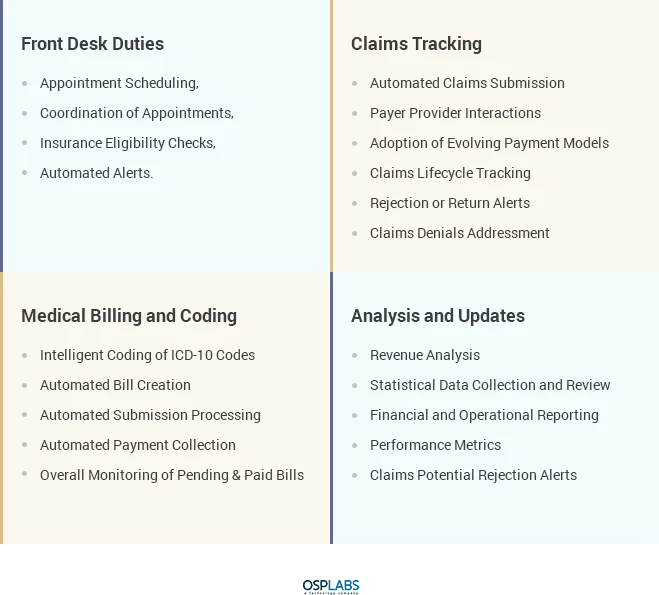The financial process of collecting medical bills to create revenue for a healthcare institution is known as healthcare revenue cycle management. RCM combines official statistics with medical billing information, such as a patient\'s private details, payer name, and medical codes. It\'s a tried-and-true way a sound RCM system could avert about 90% of claim rejections by generating reports that provide deep insight into an organization\'s finances and benchmarks. To meet the business needs, today\'s revenue cycle management Implementation is expected to follow these steps: Charge capture: For monitoring and billing, clinicians\' notes concerning an assessment of the patient are entered into a medical claims system to quickly communicate the incorporated EHR systems and charge capture systems. Coding: Coding specialists apply universally recognized medical codes to a patient\'s treatment chart record. Insurance companies then use the codes to determine the compensation amount once a claim is lodged. Claims submission: Providers submit a claim to insurers, seeking reimbursement under predetermined rates for each medical treatment code. To avoid any potential claims from being denied, accuracy is crucial. Insurer communications: To identify patient insurance rates and collect reimbursements without inaccuracies or rejections, billing managers must engage with insurers regularly. Rate and contract negotiations with insurers are also a part of the process for providers. Payment collections: Healthcare establishments bill patients for any outstanding balances after insurance reimbursements are collected. This process frequently entails assisting patients in comprehending pricing and establishing payment schedules. Medical service review: Providers frequently analyze clinical care data to save costs, maximize resources, and enhance patient outcomes. Treatments are evaluated for medical needs and the best strategy of care and treatment. However, to keep this Healthcare revenue cycle management solutions running smoothly, healthcare providers must promptly receive payments from insurers and patients. This procedure involves staying current with changing government legislation and insurer reimbursement procedures and ensuring that claims are filed and reimbursed responsibly. The intricacy of revenue cycle management, like there might be as many as a dozen steps in the process, makes it tough to avoid mistakes and setbacks. Preregistering, quantitative credit, and medical coding data must all be entered before claims are submitted. Reimbursements may be delayed or refused if claims are submitted with incorrect procedure codes or erroneous patient data. Thus, provider organizations must rapidly identify the root cause of the problem, and employees must be taught to accurately input and update patient information. Prior authorization, incomplete data, and eligibility problems were the primary causes of claim rejections and delays. There are numerous ways to improve your revenue cycle management dramatically. However, it is the minor improvements that build up to make the most significant difference. The following are some reality checked requirements for improving RCM: Adoption of Cloud-based Platforms: Cloud platforms are necessary to maintain track of patient interactions and payments. Invoicing and payment transactions, claims filing, appointment scheduling, and other tasks may all be done in one place with cloud-based RCM software. Pre-Registration: Once it comes to pre-admissions, getting in touch with patients before the day of admission allows them to ask questions that help move the process forward, such as validating contact information and maybe receiving payment over the phone. Care Coordination: Care coordination assesses the transition to value-based reimbursements by staying current on legislative and policy changes and measuring the quality of care and the organization\'s efficiency. It also arranges health and wellness clinics to improve the quality of care provided to patients. Performance tracking: Effective revenue cycle management is more than just maintaining records of the organization\'s payments and errors when filing claims. This technique determines if things are going in the proper direction and how to turn things around to manage your personnel and resources. Patient Engagement and Patient Satisfaction: Minor actions to improve the patient payment system, such as emailing them before admission, checking accurate contact information, or providing several payment options, such as loans, bank transfers, online platforms, and insurance policies, would improve their experience. Knowing and acting primarily on patients\' expectations will come in handy for both sides. Thus, healthcare organizations are now adapting to value-based payment models and increasing the need for digital solutions that will shape the revenue cycle management of the future. CONCLUSION: Front-end operations that assist claims to go along are the focus of effective care practice management strategies. Many problems arise early in a patient\'s account, and these faults can persist throughout the revenue cycle, causing claims reimbursement to be delayed. Healthcare revenue cycle management, on the other hand, is distinct in that bills and claims are typically processed over a long period. Patients do not always have the cash available to pay medical costs right away, and claims might travel back and forth between payers and providers for months until all concerns are handled. That makes it a goal of healthcare revenue cycle management to create a system that enables businesses to get full payment for their services as soon as possible.
Expectations vs. Reality: Modelling the future of Revenue cycle management.


